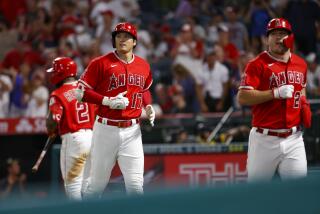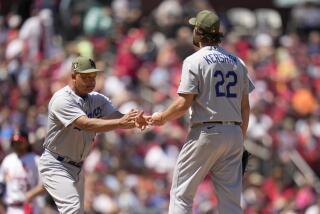Hibbs Upbeat Despite Career With a Catch : Ventura Businessman’s Memories Remain Fond Even Though Stay in Majors Lasted but 3 At-Bats
Back in 1971, the Chicago Cubs were pondering the cosmic question facing all clubs at the end of spring training: Do we keep three catchers and 10 pitchers, or two catchers and 11 pitchers? This being before the age of male sensitivity, the Cubs announced their decision in a dramatically cold way: The player who made the team would be allowed on the team bus; the other player would not.
Jim Hibbs was the other player.
“I had to watch the bus pull away,” Hibbs recalled. “Standing there with my suitcases. Crying. Really embarrassed.
“Baseball,” he said, shaking his head, “is a tough way to make a living.”
Hibbs had one of those poignant near-miss careers that can turn a man bitter in his later years, but he prefers to remember baseball as being very, very good to him. Now 46 and a Ventura businessman, Hibbs is probably the most successful player who ever batted .000 in the majors.
A Stanford All-American catcher and the leading hitter on the first U.S. Olympic baseball team in 1964, Hibbs played seven years in the minors, the last four in triple A. He was a solid hitter who batted as high as .292 in triple A and never lower than .270. But he had the misfortune of being in the Cubs’ organization when they had Randy Hundley and in the Reds’ when they had Johnny Bench.
“You’re dead when that happens,” Hibbs said.
Hibbs played only briefly in the majors. “I’m surprised he didn’t make it,” said Dodger Manager Tom Lasorda, who managed Hibbs in the Pioneer League. “I thought he had the talent to be a big-league catcher.”
Hibbs even rates a mention in Pete Rose’s autobiography, “Charlie Hustle.” Rose describes a 1970 exhibition game between the Reds and their triple-A farm team, the Indianapolis Reds. On a play at the plate, Rose steamrollered into Hibbs in what Rose calls “a spectacular collision,” similar to the one in which Rose flattened Cleveland catcher Ray Fosse a few months later in the All-Star Game. Hibbs held on to the ball; Fosse didn’t, allowing Rose to score the winning run.
“I always gave it my best shot,” Hibbs said about his baseball career. “I feel pleased I had the ability to compete at that level. The experience taught me more than anything in life.”
But life marches on, and Hibbs realized after the 1973 season “that there was no future for me in baseball,” especially with a wife and two children to support. The “mental toughness” he had learned from baseball was put to use in the business world. Quickly, Hibbs, student body president at Ventura High in 1962, became a long-ball hitter in real estate, opening his own company and becoming president of the Ventura Board of Realtors.
Now divorced, he lives alone in a spacious hillside house with a high ceiling in the living room where his memorabilia is displayed. The wall behind the bar is papered with awards: 1966 Sporting News College All-Star team, which included Reggie Jackson in center field; 1960 Ventura Babe Ruth League batting champion, with a .625 average.
Other mementos reflect his growth after baseball: a framed letter from William F. Buckley Jr.; a glass case filled with Western art. Classical music flows from the compact-disc player, which is next to the Jim Hibbs model Louisville Slugger. His bookshelves overflow with biographies, many on characters from the Old West.
His living room offers a view of the Pacific Ocean, but Hibbs prefers to work at his dining-room table and look out at the solitude and emptiness of the hills. A trout fisherman, bird hunter and marathon runner, he appears to be a man at peace with himself. A year ago, he quit the real estate business, became executive director of the Ventura College Foundation “and couldn’t be happier.”
A plaque on a wall sums up his baseball career: “Old athletes never die--they just lose their support.” His sports background certainly doesn’t open doors for him--he laughs at the thought. “I doubt if five people around here know I played pro baseball,” he said. “Unless someone brings it up, I sure don’t mention it. I don’t have much to brag about.”
What still tugs at his emotions, however, is how close he came to acquiring bragging rights. The first of “several heartbreakers” occurred in 1967, a year after he signed with the Dodgers for a $25,000 bonus. Drafted by the Angels in the off-season, he went to spring training and was shocked when the club kept him on the roster at the start of the season. A third-string catcher but a major leaguer at the age of 22, he made three pinch-hit appearances without getting a hit, then was sent to the minors, never to return.
“I wasn’t ready” in 1967, Hibbs said. “I was too young to know what the hell I was doing. All of a sudden I was there.”
And just as suddenly, he wasn’t.
Ironically, it was Rose who was responsible for Hibbs blowing his biggest chance to crack the big time. Their home-plate collision damaged Hibbs’ left knee. Later that season, after being sold to the Cubs’ Tacoma triple-A team, Hibbs reinjured the knee slipping on wet grass during a game. Being helped to the clubhouse, he was told that the Cubs wanted him in Chicago because Hundley had injured his knee.
Hundley and Hibbs wound up in the same hospital for knee surgery. “I began to recognize what fate was all about,” Hibbs said with a wry smile.
A career in the majors was not to be, but Hibbs is satisfied knowing he had everything going for him but luck and timing.
“By the time I was 25,” he said, “I had played with so many guys who had gone up that I was no longer in awe of major leaguers. I know I could have played with them.”
More to Read
Go beyond the scoreboard
Get the latest on L.A.'s teams in the daily Sports Report newsletter.
You may occasionally receive promotional content from the Los Angeles Times.










